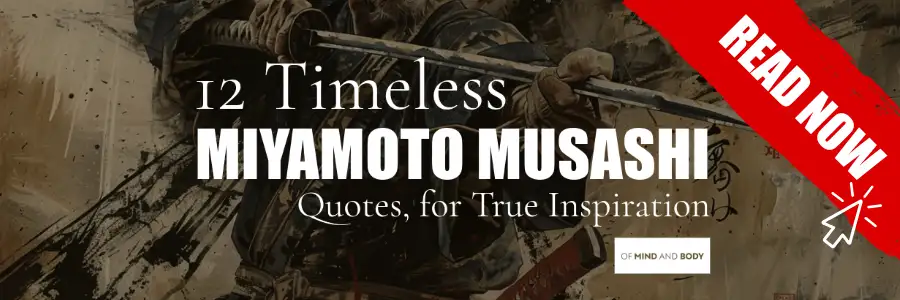
Miyamoto Musashi
Philosopher and Strategist Extraordinaire
Miyamoto Musashi, the legendary Japanese swordsman, strategist, and philosopher, is known for his undefeated record in over 60 duels and his lifelong pursuit of mastery. Musashi’s philosophy, captured in his influential work The Book of Five Rings, goes beyond swordsmanship, delving into the principles of self-discipline, strategy, and the art of living with clarity and purpose. His legacy continues to inspire those seeking to live with precision, resilience, and strength.
Musashi’s Philosophy: Mastery of Self and Strategy
Musashi’s philosophy centers on the idea that true mastery requires not only technical skill but also an unshakable mind and spirit. He taught that discipline, adaptability, and mental clarity are essential for success in all pursuits, whether in combat or in life. Musashi’s “Way of Strategy” encourages a focused and practical approach, urging individuals to prepare thoroughly, act decisively, and remain undeterred by obstacles.
At the heart of his teachings is the concept of continuous improvement and self-reliance. Musashi’s approach emphasizes embracing challenges as opportunities for growth and approaching life’s battles—literal or metaphorical—with a clear mind and steady hand.
For a deeper look at Musashi’s philosophy and his journey toward mastery, explore our full article:
The Wisdom of Musashi: Quotes on Discipline and Strength
Musashi’s reflections reveal a powerful mindset rooted in discipline, focus, and self-determination. His words encourage us to cultivate inner strength, to prepare for challenges, and to approach every task with full commitment. Musashi’s quotes offer guidance on resilience, adaptability, and the importance of staying grounded in the present moment.





Explore some of Musashi’s most impactful quotes and the lessons they offer for living with purpose in our curated selection:
The Book of 5 Rings
“The Book of Five Rings,” written by Miyamoto Musashi in 1645, is a seminal work on strategy and martial arts. The book is divided into five sections: Earth, Water, Fire, Wind, and Void, each representing different aspects of combat and strategy. Musashi’s teachings emphasize the importance of mastering fundamental principles, adapting fluidly to circumstances, understanding the dynamics of direct conflict, and gaining insights from various perspectives. The final section, Void, delves into the unseen and intuitive aspects of mastery. Revered by martial artists and strategists alike, “The Book of Five Rings” offers timeless wisdom applicable to many fields beyond the martial arts.
Dokkōdō: the Path of Aloneness
“Dokkodo,” also known as “The Way of Walking Alone,” is a short work composed by Miyamoto Musashi shortly before his death in 1645. This philosophical text consists of 21 precepts outlining Musashi’s principles for living a disciplined and independent life. Each precept emphasizes self-reliance, simplicity, and the importance of inner strength. “Dokkodo” reflects Musashi’s deep commitment to the path of the warrior, advocating for a life free from attachment, focused on personal integrity, and guided by unwavering resolve. These teachings continue to inspire those seeking to cultivate a resilient and principled approach to life’s challenges.
Subscribe
Sign up with your email below and receive:
- 5 Day Introduction to Stoicism Course
- 10 Stoic Quotes Phone Backgrounds
- Defining your Values and Beliefs eBook
- Weekly Newsletter and Alerts to the Latest Articles
Start building your Stoic mindset today!
*We respect your privacy and will never share your details with anyone.


